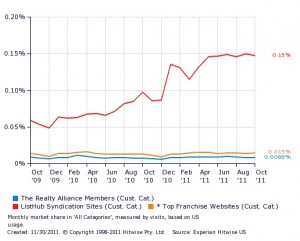 One of the pleasures of working at the WAV Group is the barrage of business questions that we are tasked to answer on a regular basis. Often, the questions challenge conventional understandings about the effectiveness of strategies in real estate.
One of the pleasures of working at the WAV Group is the barrage of business questions that we are tasked to answer on a regular basis. Often, the questions challenge conventional understandings about the effectiveness of strategies in real estate.
A key strategy discussion among executives at large broker firms and at large franchise organizations surrounds listing syndication to FSBO websites. Syndication strategies that each firm chooses varies relative to local market competition and consumer behavior. I highlighted that last sentence because it is the most important statement in this blog post.
Many brokers and franchises are looking at what appears to be a radical move by Edina Realty and Shorewest REALTORS to pull out of syndication to FSBOs. It is not radical at all. It is sound business reasoning based upon measuring consumer behavior in their marketplace. At its foundation is the understanding that consumers visit agent, broker, franchise, and FSBO websites to get listing information. Consumers choose websites that they like and trust. In the case of Edina and Shorewest, consumers have chosen their websites above all others. In each case, the brokerage has more consumer traffic than any other real estate website in their region. They earned it. Their decision not to syndicate is a calculated and prudent business decision based upon sound local research. In their unique case, they cannot leverage their listings to fish up stream for consumer traffic, to introduce their brand, or to start a consumer relationship. They are up stream, they have bigger brands that consumers trust and choose. Everyone else is a laggard with desire to borrow their listings and their brand equity to provide a comprehensive search to consumers. They are in a unique position. Others will follow the path they cut, and the trend will make a material change the online landscape of consumer search.
This market positioning is rare. WAV Group WIN Reports publishes studies of consumer real estate search behavior in every region of the United States. Fewer than a dozen brokers rank in the top 10 of search sites in the markets they serve. Any large broker who does not dominate will need to do some form of syndication to FSBO sites to fish upstream for consumers, but they must do it carefully, with purpose, and measure results. The goal is to reach the top position of consumer traffic in your market.
If you are a small broker (fewer than 75 agents), cast the largest net possible. Go to Listhub or Point2 and turn it all on – it is your only chance of online lead generation. Consider using an inexpensive template website as a calling card, and invest in enhancing listings on the FSBO sites. If you have fewer than 500 unique visitors to your website per week, your website likely costs you more than it yields. This suggestion does not apply to luxury home brokers or small luxury markets.
 FSBO websites*, represented by the red line, have experienced growth over the past few years. (*note: REALTOR.com is included in this aggregation but is not a FSBO website nor does it display syndication listings.)
FSBO websites*, represented by the red line, have experienced growth over the past few years. (*note: REALTOR.com is included in this aggregation but is not a FSBO website nor does it display syndication listings.)
Balanced reasoning would expect that large broker websites and franchise websites that feed listings to those third party FSBO websites would grow along with them. In this case, balanced reasoning fails.
Franchise websites (Yellow line representing REALOGY, Keller Williams, RE/MAX) have not seen any growth since 2009.
The Blue line represents The Realty Alliance broker websites – the top 65 or so brokers in America. Like Franchise websites, they have not seen any significant growth since 2009.
This data is painting with a very wide brush. As I mention above, this type of analysis needs to be performed at a local level in order to see if consumers are following this national trend, or bucking it.
Yesterday, an 82 year old broker told me that he somehow managed to sell real estate before the internet existed. He sold real estate before the MLS existed. He sold real estate before REALTOR.com existed, along with the FSBO websites. He says his company’s unit volume has grown commensurate with population growth in his area.
He says that online marketing has not improved his business effectiveness, it has just changed it. He said that before listing syndication, consumers went to his website or the website of another broker or agent to find a home. Before that, they called an agent or stopped into a real estate office. That is changing today, and he struggles to understand how that is going to improve his company.
In his boardroom, he tells this story to his children and grandchildren. They are amped up on Starbucks and iPads, texting during the conversation. I wonder if they are listening.





[…] Previous post: FSBO Sites Grow as Broker and Franchises Languish […]